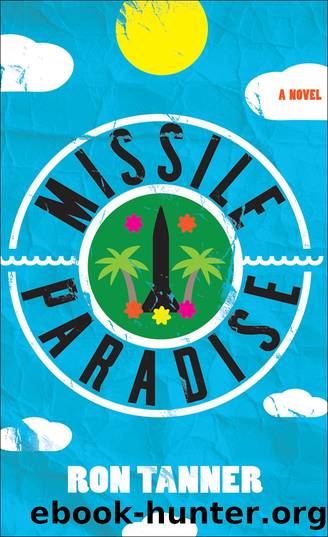Missile Paradise by Ron Tanner

Author:Ron Tanner
Language: eng
Format: epub
ISBN: 9781632460127
Publisher: IG Publishing
Published: 2016-03-07T00:00:00+00:00
PART II
ELEVEN
The Alberg 35 is a remarkable boat, especially sturdy because it was constructed in the 1960s before builders knew the full capacity of fiberglassâwhich means they overbuilt the hulls. Its full keel makes it very stable, especially when skidding down a wave. Its swan-tail stern, its low free-board, and stepped-coach roof give it a classic look, like something from the 1920s. Thereâs not a lot of head room, even the fans of the Alberg will tell you, but the cabinâs well laid out, with a fairly spacious V-berth in the forward. Like most production boats, all of the Albergs are numbered. Cooperâs was number 282, built in 1967 at the Whitby yard in Ontario, Canada. Itâs a number that comes to him now in odd ways, when he reads tide charts, when he works through algorithms in his practice programs, when he glances at his bedside digital alarm in the early morning. Even when heâs dialing Lillianâs number, â282â is right there in the middle.
He did some custom work on his Alberg, reinforcing the mast with two arches of 4-inch-wide aluminum at the step beam because, over the years, the beam had shrunk. He also increased the water hold three-fold, installed an enzymatic treatment system for his head, a larger tank for diesel, and put in a breaker panel after switching the electrical system from 6 to 12 volts. One thing he didnât do was ground the mast for lightening strikes. Thatâs a judgment call because a grounded mast, of course, has more conductivity. He feared lightning strikes more than rogue waves.
All of this he finds consistently, thoroughly fascinating. But nobody wants to hear it. Heâs a bore when he tries to describe, say, the nuance of water, how a dark spot in the distance might be a coral head or a cloud shadow or a frightful anomalous chasm. Approach it at your peril! And how about this: in the open sea, some parts of the ocean are totally devoid of GPS signals. Those signals, even in the best of circumstances, are often abused and deformed by solar flares and other electromagnetic act-ups. Sometimes you have to rely on an old fashioned compassâpretty much the kind John Paul Jones used. Or Blackbeard the Pirate. And how about the garbage? Miles of garbage caught in currents and carried in ocean-wide gyres that look like the leavings of an obliterated armada. Fascinating and appalling. And porpoises racing his boat, so many porpoises he canât count them, bulleting through the whitecaps, their speed seeming to propel him, their gleeful company like a heroâs welcome.
What he wonât tell anybody is the nightmare that now plagues him. Actually, itâs a dreamy reenactment of a mistake he made before he reached Hawaii. The kind of mistake that happens to a lot of sailors. He fell overboard for no good reason. The Lickety Split sort of hiccupped and the next thing he knew he was in the water. The stupid thing is that he wasnât tethered to his lifeline.
Download
This site does not store any files on its server. We only index and link to content provided by other sites. Please contact the content providers to delete copyright contents if any and email us, we'll remove relevant links or contents immediately.
Sita - Warrior of Mithila (Book 2 of the Ram Chandra Series) by Amish(54823)
The Crystal Crypt by Dick Philip K(36836)
Cat's cradle by Kurt Vonnegut(15302)
Always and Forever, Lara Jean by Jenny Han(14873)
Ready Player One by Cline Ernest(14618)
The Last by Hanna Jameson(10229)
Year One by Nora Roberts(9763)
Persepolis Rising by James S. A. Corey(9335)
The remains of the day by Kazuo Ishiguro(8949)
Never let me go by Kazuo Ishiguro(8849)
Red Rising by Pierce Brown(8732)
Dark Space: The Second Trilogy (Books 4-6) (Dark Space Trilogies Book 2) by Jasper T. Scott(8157)
The handmaid's tale by Margaret Atwood(7729)
The Circle by Dave Eggers(7090)
Frank Herbert's Dune Saga Collection: Books 1 - 6 by Frank Herbert(7038)
The Testaments by Margaret Atwood(6866)
Legacy by Ellery Kane(6636)
Pandemic (The Extinction Files Book 1) by A.G. Riddle(6509)
Six Wakes by Mur Lafferty(6221)
